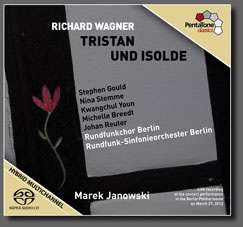|
Back
11/28/2012
Richard Wagner: Tristan und Isolde
Stephen Gould (Tristan), Nina Stemme (Isolde), Kwangchul Youn (Konig Marke), Johan Reuter (Kurwenal), Michelle Breedt (Brangäne), Simon Pauly (Melot), Clemens Bieber (Ein Hirte), Arttu Kataja (Ein Steuermann), Timothy Fallon (Ein junger Seemann), Rundfunkchor Berlin, Rundfunk-Sinfonieorchester Berlin, Marek Janowski (conductor)
Recorded live at the Berlin Philharmonie (March 27, 2012) – 224’59
Pentatone PTC 5186 404 – Hybrid Super Audio CDs with essays in German, French and English and text and translations in German and English

   
Pentatone is doing a marvelous job in getting these things churned out. Their latest release in their series of recordings of Wagner’s 10 mature operas marks the halfway mark in Tristan und Isolde. According to the linear notes, this release was taken from a single concert recording. The result is a recording of palpable dramatic energy that, while irrepressible, is not always successful. Yet it contains some very compelling singing, mostly in the person of Nina Stemme who makes this a recording of Isolde with some Tristan on the side.
Stemme had previously recorded the role in what was a breakout for her with an all-star cast featuring Plácido Domingo as her Tristan. She was a revelation then and continues to be now. Stemme posses a voice of unique power, but also magnificent control. Her sound may be a bit broad for some people’s taste, but it is still focused. The length of Isolde’s role in and of itself is daunting, and Stemme breezes through it with stamina to spare. The breadth of her middle voice forms an impressive foundation for her entire range that allows her to fully envelope the listener in soaring sound. Her first act, scene three monologue is memorably executed with a colorful delivery (“Den hab ich wohl vernommen”). Her high notes are thrilling, all perfectly spot-on, particularly in the second act meeting with Tristan, and her “Liebestod” is sumptuous. It is a vocally brilliant performance with a compelling dramatic vision along with it.
Unfortunately, her Tristan, Stephen Gould, is not in the same league. While his singing is at times pleasant, his technique is inconsistent, resulting in varying speeds of his vibrato which tends to slow and widen above the staff. In his low range, his voice sounds positively baritonal, and he portrays strength and stoicism in the first act with convincing ability. It is above the staff and when the score calls for more subtle singing he runs into trouble. This is most apparent in the second scene love duet in Act Two. Gould isn’t quite able to effectively scale back his singing through the passaggio in Tristan’s tender declaration of love in “O sink hernieder, Nacht der Liebe.” The tenor is at his best, however, in Tristan’s extended monologue at the beginning of Act Three. He portrays the dying hero with a resonant sound and sympathetic anguish.
The supporting cast is outstanding, for the most part. While Michelle Breedt’s Mezzo-soprano often seems light in comparison to Stemme’s soprano, she soars through the orchestral texture with a lyrical soprano voice with fine dramatic instincts in portraying the conflicted maid. Kwangchul Youn as King Marke sings with a somewhat wooly sound but is sympathetic in his Act Two monologue. Johan Reuter as Kurwenal sings with a robust and buoyant baritone voice that is not particularly biting in Kurwenal’s mockery of the women in Act One, but is lyrical. The rest of the cast are fine as well, with Timothy Fallon as the young sailor setting a wonderful scene at the outset of the recording.
This brings us to Marek Janowski and his forces who are the backbone of this series of recordings. Oftentimes the reading feels rushed for the sake of doing so. Occasionally it can be thrilling, but in the case of the first act conclusion, it runs the risk of running the singers ragged and losing dramatic tension. The leads sound frantic at “Treuloser Holder!” and do well to keep up. In the case of the duet in Act II, the opposite is the case where it seems more brevity might have done the singers, particularly Gould, some good. Oddly, it just seems to languish. In general, there are missed opportunities that won’t make you leave behind your Böhm or Furtwängler recordings.
The sound is very well captured. The singers move as the action between scenes dictates and the effect is very well done on the recording, painting a vivid image of the concert stage. Surround SACD sound is slightly dry and bright, but realistic. The augmented brass appear from the rear channels at the end of Act I and are very well blended with the rest of the orchestra. The presentation, as with all in this series, is beautiful. The thick booklet bound with the CDs is a luxury. It would be impossible to recommend this Tristan as a first or second choice, but it is a nice continuation of the series. Nina Stemme is the real draw to be sure, and one that some may find compelling on its own.
Matthew Richard Martinez
|